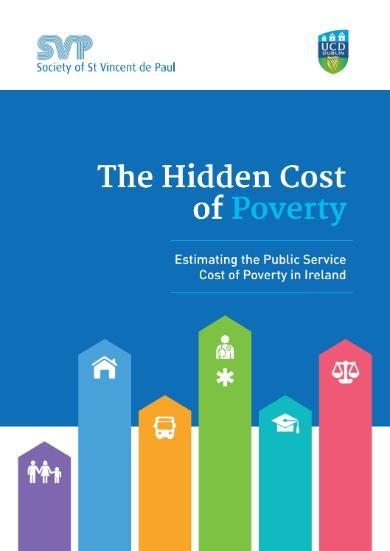The Hidden Cost of Poverty: Estimating the Public Service Cost of Poverty in Ireland

Commissioned by the Society of St Vincent de Paul (SVP), June 2020
Full report available (opens in a new window)here
Principal Investigator
(opens in a new window)Dr Micheál Collins
Email: (opens in a new window)ml.collins@ucd.ie
Project Outline
Living life on a poverty income is common in Irish society. It is the reality for around 700,000 people living in 270,000 households across the state. By necessity living life on such a low income imposes costs on these individuals and families. Alongside these individual costs, poverty is responsible for other costs. In particular, the presence of poverty in a society triggers demands on the public purse. These costs derive from the identification of poverty as a determining factor in the need for, and demand for, a wide range of public services and policies ranging across almost all areas of public policy. Poverty triggers needs and responses by the state, not always at the ideal level of adequacy, but nonetheless involving resources that are allocated to addressing the fallout from current and past experiences of poverty.
Aims and objectives
This research estimates the additional public service costs that Irish society carries as a result of current and past experiences of poverty. It does so to establish a heretofore absent benchmark for the recurring annual costs
to the state of poverty, and to highlight for all members of society, whether they are above or below the poverty line, the costs incurred by society as a result of poverty.
Methods
The costings derived in this course of this research are driven by available statistical and administrative data from the Central Statistics Office, various Government departments and agencies, answers to parliamentary questions and the published results of related studies both nationally and internationally. Data on the outcomes and incomes of the population has also been analysed using microdata from the CSO’s Survey on Income and Living Conditions.
Here these data are used to establish a main, low and high cost of poverty estimate for each category of public expenditure.
Our approach is to determine an indicative main estimate, built around the evidence, data and international literature. The main estimate is determined simultaneously with a low-estimate, which reflects a more conservative approach to determining the cost of poverty, and a high estimate reflecting the likely upper-limit of these costs. Collectively, the estimates give a range for the overall public service cost of poverty.
Our examination of the cost of poverty is categorised into six broad areas of public policy and expenditure:
- Health Care
- Children and Families
- Education and Training
- Housing
- Gardaí, Criminal Justice and Emergency Services
- Certain Welfare Supports
Within these broad areas we examine a total of twenty-five individual areas or expenditure programmes, accounting for a total of €27.9bn in annual state spending.
Selected findings
The scale of annual state expenditure identified as being associated with the current and past effect of poverty is substantial and carries a number of policy implications.
- The existence of poverty is impacting everyone in Irish society and not just those on incomes below the poverty line. In particular, a large amount of the money raised and spent by the state every year is associated with the ways that poverty damages peoples’ lives.
- There is potential for a new suite of public policies focused on addressing and reducing the current experiences of poverty and their past consequences. These have the potential to create a virtuous circle for society, where the lives of the least well off are improved while simultaneously freeing up government resources to focus on other public policy priorities.
- Some of these savings have the potential to arise in the short-term while others,
in particular those associated with legacy impacts of poverty and disadvantage, will take time to appear. - In some areas the state will need to ‘invest to save’ by increasing commitments and spending so that
the substantial medium to longer-term savings can be realised.
- Some of these savings have the potential to arise in the short-term while others,
- Year after year poverty imposes substantial costs on all of Irish society. While these fall heaviest on those
living on the lowest incomes within our society, there are substantial costs borne by all. Consequently, there are benefits for all associated with a coherent national strategy to address and successfully reduce poverty and
its consequences. - For many years Ireland was an international leader in the adoption of National Anti-Poverty Strategies which were targeted at addressing the challenges identified in the course of this research. Regrettably, in recent years this focus has slipped but as this report demonstrates there are substantial benefits for all to be gain from a
renewed national policy focus on addressing and reducing the number of people in our society living life below the poverty line.